Recap: “Taking Back Our Narrative” Event Sponsored by the Kennedy Center for the Performing Arts and the Arab America Foundation was a Smashing Success with over 1200 in Attendance from 26 States
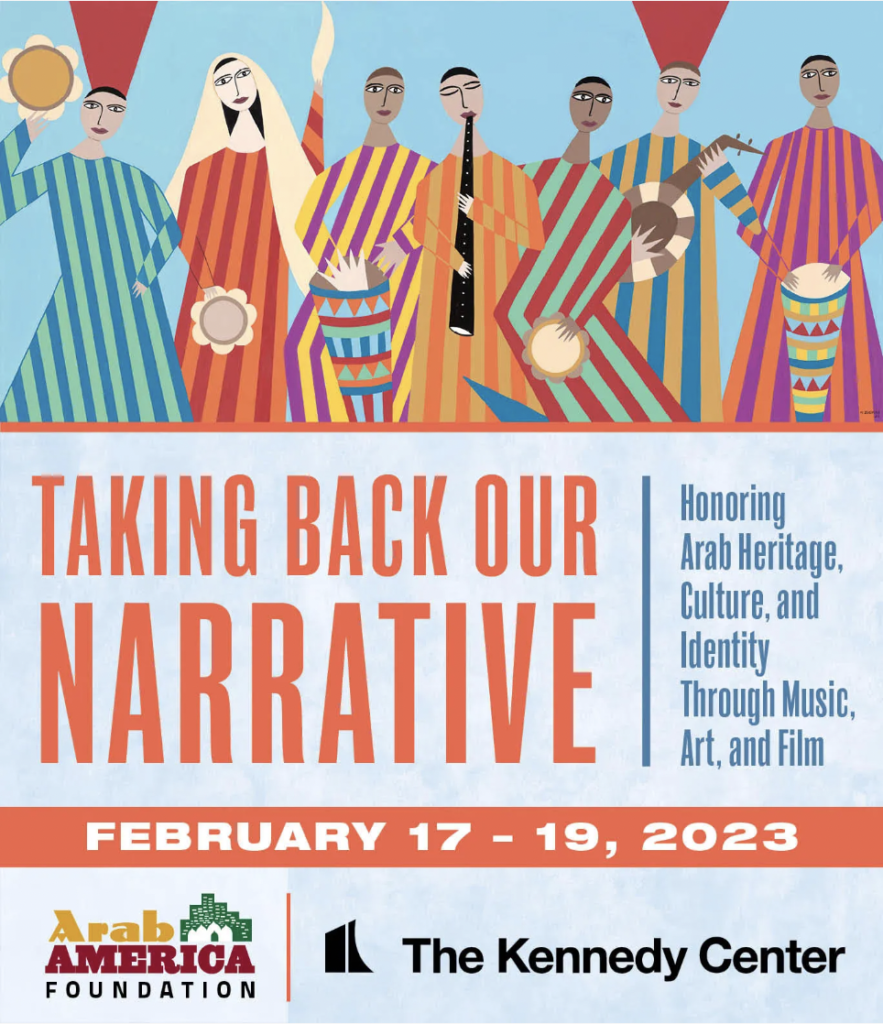
By: Salma Heram and Adam Abdel-Qader / Arab America Contributing Writers
The Arab America Foundation, in collaboration with the Kennedy Center, hosted its historic “Taking Back Our Narrative” event from February 17-19, 2023. During the three-day event, the Arab America Foundation highlighted some of the most invaluable aspects of Arab culture and heritage through displays of art exhibitions, musical performances, dancing, and film screenings.
The “Taking Back Our Heritage” initiative was established by the Arab America Foundation in collaboration with the Kennedy Center for the Performing Arts to promote an accurate narrative of the Arab American identity and to dispel the negative and maligned imagery directed against Arab Americans in the US. The goals of the event mirrored the mission of the Arab America Foundation to celebrate Arab American heritage, enhance understanding of Arab identity and culture in America through education, and connect Arab Americans across the US with other diverse organizations to counter social inequality.
The event featured an outstanding performance on Friday evening by the National Arab Orchestra (NAO) under the Music Direction of Michael Ibrahim. It included Arab vocalists such as Nai Barghouti, Usama Baalbaki, and Lubana al-Quntar, who all put on terrific performances emphasizing the beauty of Arab culture and music. On Saturday evening an exhilarating performance by the Arab pop singer. Emad Batayeh, and on Sunday a diverse selection of award-winning short films presented by the Arab American Film and Media Institute. Throughout the weekend guests witnessed an art exhibition by Arab American artist Helen Zughaib.
Before NAO took the stage at the Eisenhower Theater on Friday night, the Arab America Foundation put on an engaging reception of around 250 people with food, drinks, networking, and keynote speakers, including Warren David, President of Arab America and Co-Founder of the Arab America Foundation. Along with the concert and reception, various activities, such as Arab dance, film screenings, and a performance by Arab pop vocalist Emad Batayeh took place from Saturday to Sunday. Altogether, the weekend was an unforgettable and historical experience for all registrants who were in attendance.
The Arab America Foundation (AAF) is a nonprofit 501(c)(3) cultural and educational organization that promotes Arab heritage, educates Americans about Arab identity, and connects and empowers Arab Americans across the United States.
Friday, February 17th, 2023:

The event started on Friday, February 17, 2023, when Arab America and Kennedy Center staff directed guests towards the Reach at the Kennedy Center, where guests were gathered and greeted for the reception. We welcomed all guests into the reception lounge for networking, where all attendees could walk around and greet one another while enjoying refreshments and hors d’oeuvres inspired by Arab cuisine. After socializing, taking pictures with guests, and indulging in various food and drinks, Warren David, President of Arab America and Co-Founder of the Arab American Foundation, along with other keynote speakers, took the podium and gave regard to the “Taking Back Our Narrative” event explaining the noble initiatives behind it while emphasizing the necessity to display an accurate portrayal of the Arab American experience and the vast diversity residing within it.
Friday’s Reception:

Mr. David started the reception’s opening remarks by expressing gratitude for the Arab America Foundation partnering with the Kennedy Center and the Conflux Social Impact Initiative to present “Taking Back Our Narrative.” He then went on to express the primary objective of the foundation and event as they aim to “challenge the negative and often inaccurate portrayal of Arab Americans in the mainstream media and society” and “enhance understanding and appreciation of Arab identity and culture, celebrate Arab American heritage and provide an accurate image to counter social inequality.” After Mr. David’s empowering comments, he outlined the weekend’s festivities. Emphasizing the National Arab Orchestra and featured vocalists, which would be performing that night, he then went on to announce Arab pop vocalist Emad Batayeh who would be performing on the Millennium stage on Saturday, and that a short film screening sponsored by the Arab Film and Media Institute would take place on Sunday. Mr. David also made a note to express that Helen Zughaib’s art exhibit would be on display throughout the entire weekend. At a moment’s notice, guests were applauding in reaction to all the artists and performances being recognized. And finally, for the last words of Mr. David’s opening remarks, he acknowledged and thanked all the sponsors who collaborated with the Arab America Foundation to make the event a reality.

Shortly after Mr. David’s last words, he introduced the next speaker, Issam Andoni, Vice Chairman of the Arab America Foundation. Issam Andoni is a respected technologist and entrepreneur. As an active member of the Arab American community, he also holds a position as Chairman of The Andoni Family Foundation, which has dedicated itself to promoting technological progression in Palestine. As Mr. Andoni took the podium, he welcomed all reception guests to the event and highlighted what the Arab American Foundation is and what it does. In his vision, he summarized the Arab America Foundation in three powerful words, “We connect, we empower, and we educate.” Mr. Andoni emphasized the foundation’s vital roles, including educating American society and media about Arab culture, values, and heritage. Connecting Arab Americans with one another was also a significant point of emphasis by Mr. Andoni. Ultimately, that led to his overall message that through education and connection, we can achieve empowerment within the Arab American community. Mr. Andoni left off by regarding the importance of the foundation providing a unified interest for all Arabs to convene on behalf of a shared culture and heritage.
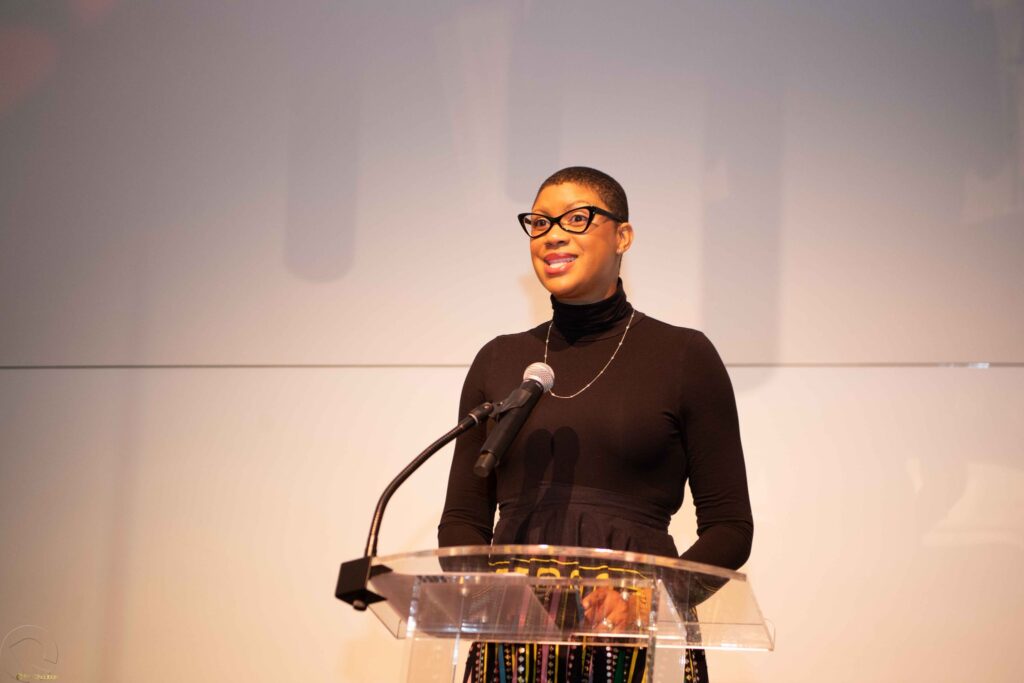
Next, Mr. David introduced Victoria Murray Baatin, Senior Director of Social Impact at the Kennedy Center. After welcoming guests to the Kennedy Center, Ms. Baatin explained her role as a leader of a 12-member team working in “systemic allyship hyper-locally across DC, across the country, and across the world.” As she gestured to the waterfront to the side of the reception venue, Ms. Baatin explained the meaning behind the name “Conflux: Social Impact Initiative,” defining a conflux as an area where two bodies of water join together. As such, the Kennedy Center sits on the conflux of the Anacostia and Potomac Rivers, to which Ms. Baatin drew a parallel as Arab America quite literally came together with the Kennedy Center that evening.

Next, the immensely talented conductor, composer, educator, and multi-instrumentalist Michael Ibrahim took the stage. As founder and Musical Director of the National Arab Orchestra, he would lead their performance that evening. Ibrahim began by thanking guests for their unwavering support, emphasizing that the best way to preserve our culture and promote our heritage is through the arts. He then uplifted guests in anticipation of the NAO’s show, reassuring them that it would not be long before they enjoyed the upcoming dazzling performance.
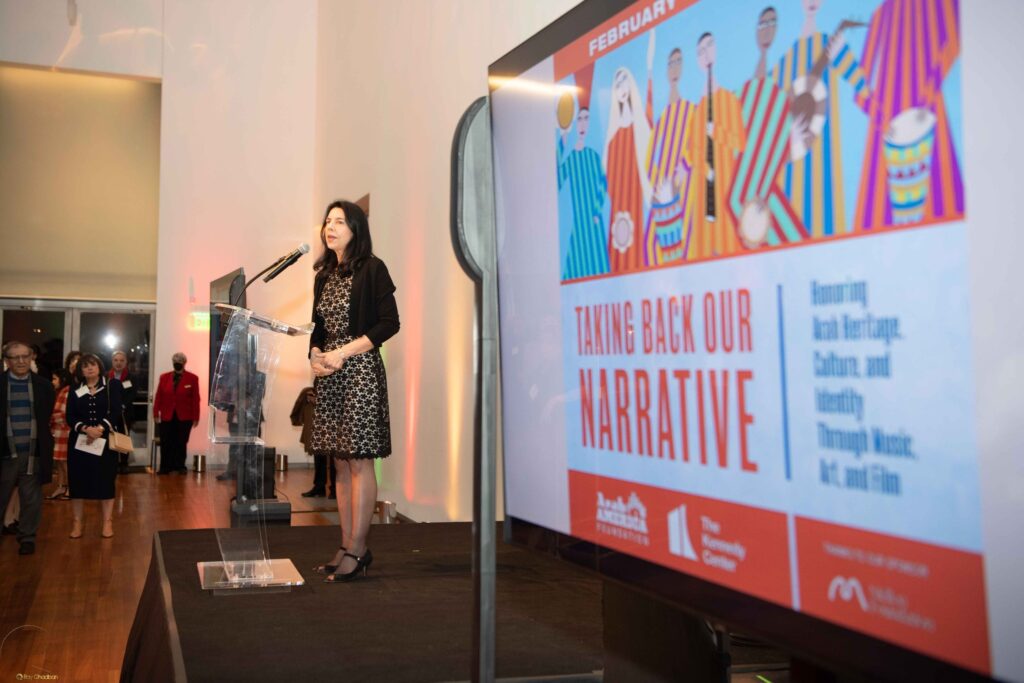
Shortly after Michael Ibrahim stepped off the podium, Mr. David introduced the creator and artist of the leading art exhibit on display for the entire weekend, Helen Zughaib. As Mrs. Zughaib took the stand, she thanked many individuals and the Kennedy Center, who were all instrumental in organizing the exhibit outside the Eisenhower theatre. She also went on to express the hospitality and how at home she has felt through her collaboration with Arab America and the Kennedy Center. Notably, Mrs. Zughaib made an inspiring remark regarding the expression within the arts and how it allows all artists to show and tell stories to one another to show that were more similar than were not.
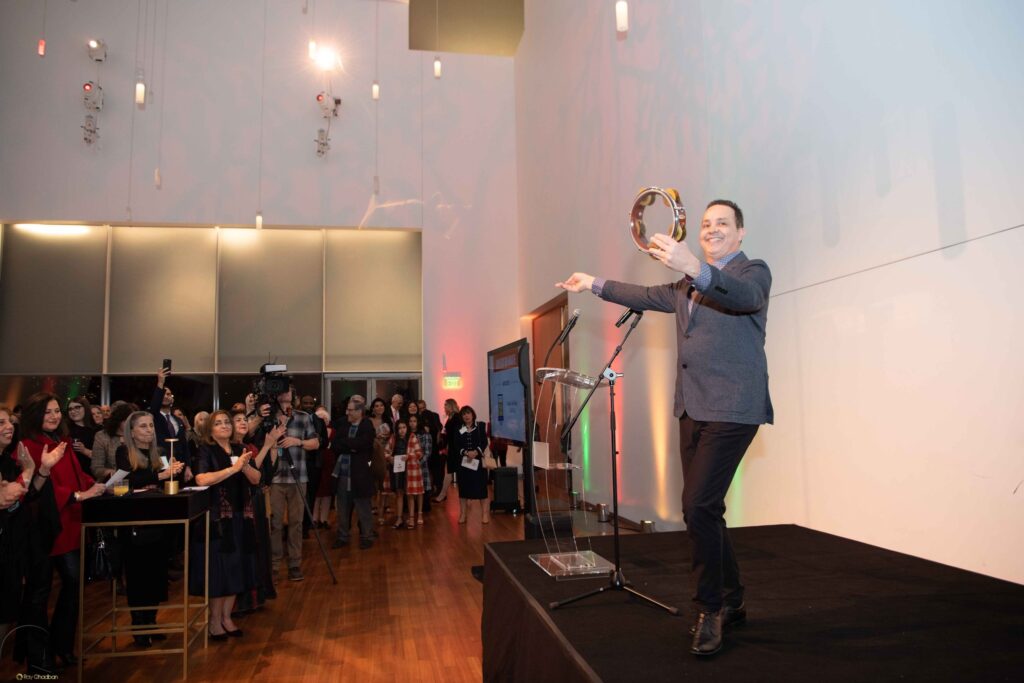
To end the afternoon, Egyptian performer and musician Karim Nagi provided a dance and music demonstration with steps and rhythms from around the Arab world, providing a preview as he would perform with the NAO that evening. He started with a rhythm called “Alshaabi” from Morocco, showing the dance accompanying it. He then moved on to his home country, Egypt, where he featured the “Fallahi” style, an upbeat rhythm with quick footwork. Next was the “Saudi” rhythm from Saudi Arabia, a slower, high-low beat. Finally, Nagi demonstrated the “wahda wa nos,” from Palestine while also slipping in a quick beat from Iraq and Yemen in response to an enthusiastic audience member. Nagi emphasized that despite us all being Arab, it is crucial to recognize the variety and diversity within our respective ethnicities and cultures.
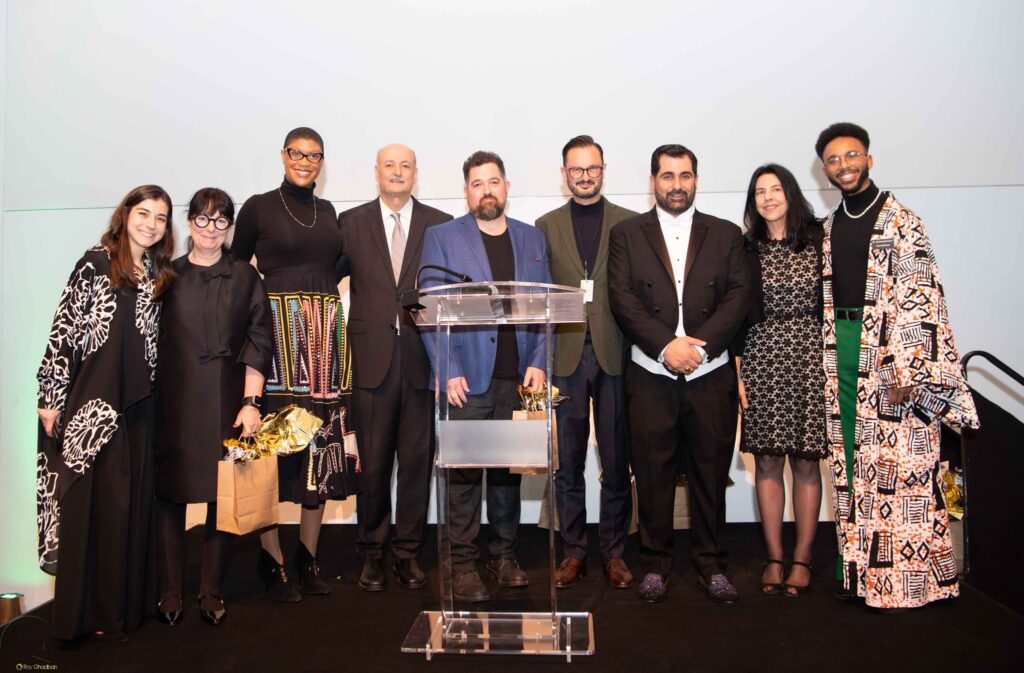
Art Exhibit:
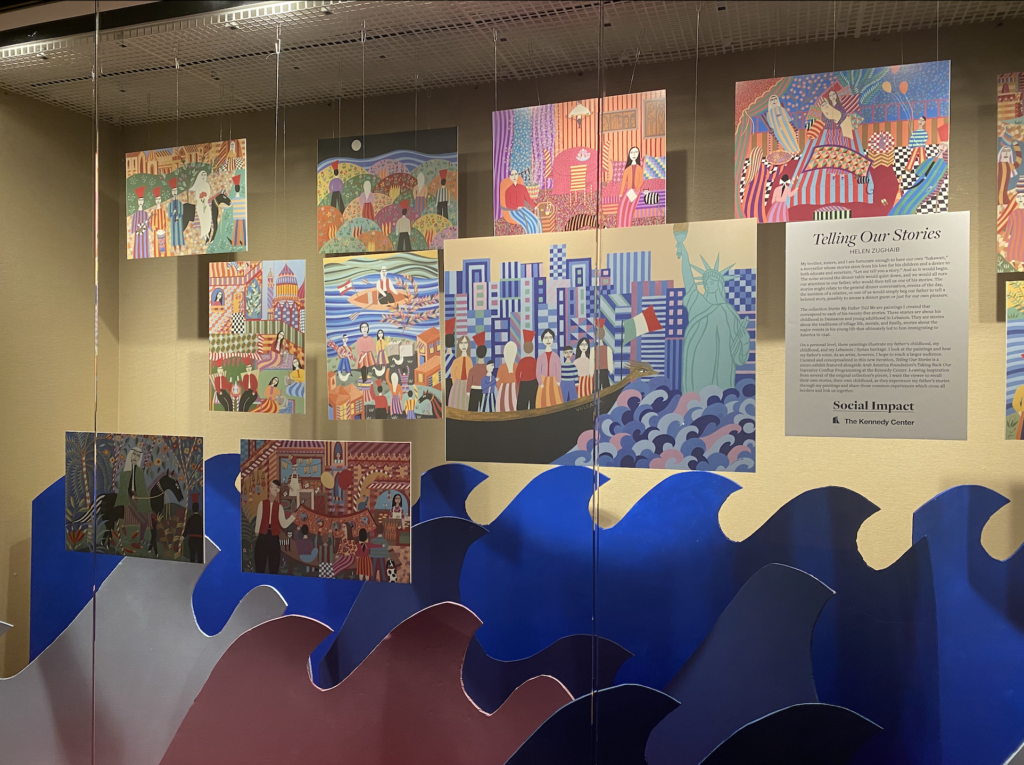
From the moment guests entered the Kennedy Center this weekend, hung outside the entrance of the Hall of States, and placed in front of the Eisenhower Theater, Helen Zughaib’s riveting and otherwise deeply meaningful artwork was put on display for all guests to see. She was born in Beirut, Lebanon, where she mainly lived in the Middle East and Europe before attending college at Syracuse University to study art. Her work has been highly influential for Arab Americans and displayed in many galleries and museums throughout the United States, Lebanon, and Europe.
Helen Zughaib has dedicated her artwork to creating valuable and meaningful connections among all her viewers. She has fostered this by emphasizing that before taking note of her artwork, the viewer should “see through someone else’s eyes, walk in another’s shoes. To accept the ‘other.’ To reject divisiveness. To promote acceptance and understanding and to reject violence of subjugation of anyone anywhere.”
Mrs. Zughaib’s art exhibit, Telling Our Stories, was a micro-exhibit based on Helen’s original collection Stories My Father Told Me. Throughout the captivating Telling Our Stories exhibit, attendees indulged in each painting, revealing layer upon layer of Helen and her father’s fascinating and compelling heritage and history. This new iteration displayed outside the Eisenhower theatre illuminated a special message that Arab America strove to express throughout the three-day event. As Helen Zughaib describes in her brief description, which she showcased along with the paintings, “I want the viewer to recall their own stories, their own childhood, as they experience my father’s stories through my paintings and share those common experiences which cross all borders and link us together.” Mrs. Zughaib brought it home with this quote, emphasizing her and many other Arab Americans’ dreams to cross societal boundaries and connect with one another based upon a mutual understanding of the extensive range of diverse experiences and stories that every life has in this world while also recognizing similarities within them as well.
For Photos of the Reception and Friday Night Concert Click Here
Friday’s Concert:
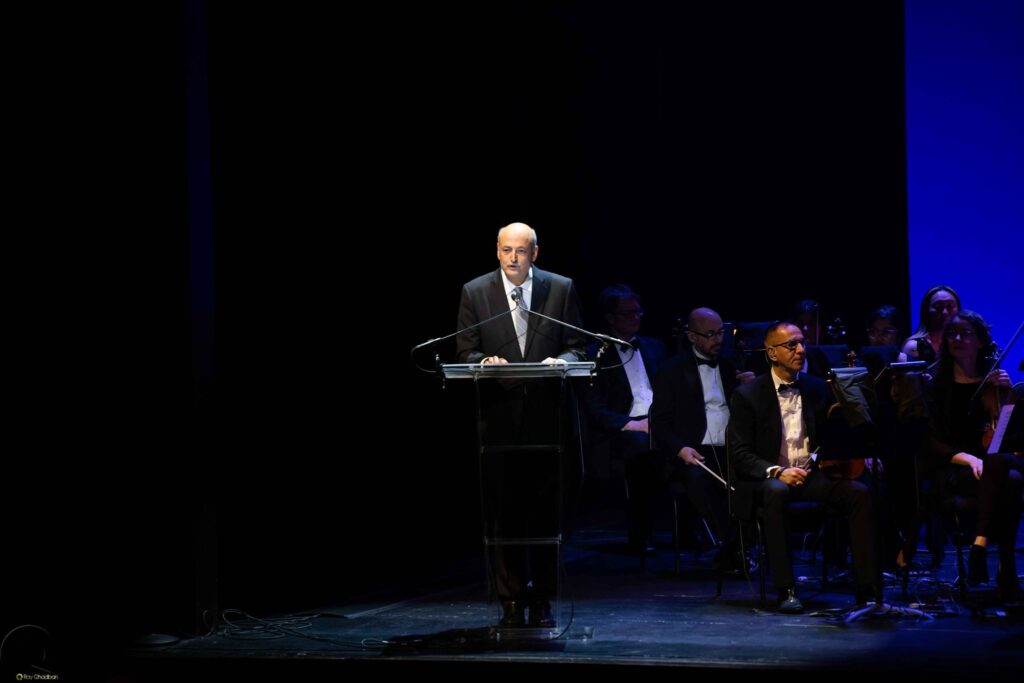
After a dazzling reception filled with community, laughter, signing, and dancing, the main event of the evening began with opening remarks by Warren David. Upon taking the stage, Mr. David prompted guests to rise for a moment of silence in remembrance of the victims of the earthquake that struck Syria and Turkey less than two weeks prior. This time of silence and respect served as a somber reminder that even in times of joy and history-making, it is vital to recognize the experiences and suffering of those in our community and always stand by them in times of happiness and solemnity. After the audience took their seats, Mr. David welcomed all attendees to the Kennedy Center. He recognized the terrific partnership that Arab America has formed with the Kennedy Center and the Conflux: Social Impact Program. He then shared with the audience the story of Khalil Gibran, Lebanese-American writer, poet, and visual artist, who led “Al-Rabata Al-Qalamiyah,” or “the Pen Bond.” Members of Al-Rabata sought to preserve and promote Arab literature, art, and culture in North America “rather than see it to decay and disintegrate.” Mr. David then reminded the audience that, as written in the movement’s bylaws, “we would be true to ourselves if we would be true to our ancestors.” Although Al-Rabata was disintegrated after Khalil Gibran’s death, Mr. David expressed that Arab America Foundation is one of the organizations that follow in its footsteps, promoting Arab heritage and countering degrading images “directed against Arab Americans in the media, in literature, and in political rhetoric.” Mr. David concluded by emphasizing that “tonight, as we make history at the Kennedy Center and emulate Gibran’s movement and are true to ourselves, we seize our narrative and tell our story as only we can tell it–we would make our ancestors proud.”
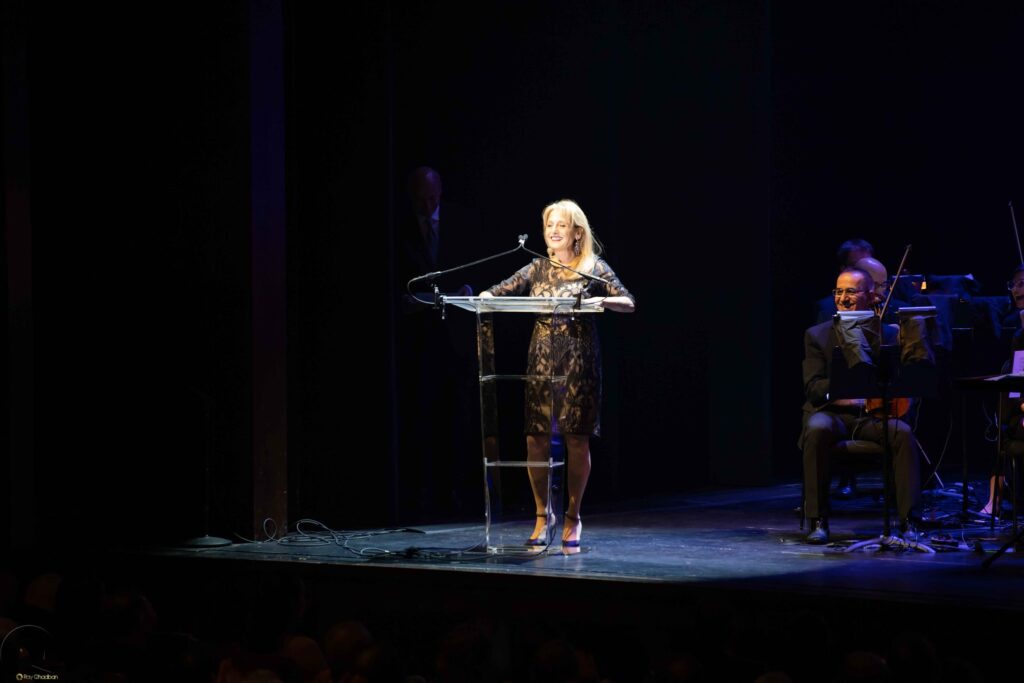
Warren David then introduced his wife and co-founder of Arab America, Dr. Amal David, whose energy was infectious as she thanked all guests and attendees, saying that they are the “wind beneath the wings” of the National Arab Orchestra and Arab America. Next, Warren David welcomed Marc Bamuthi Joseph, the Vice President and Artistic Director of the Kennedy Center’s Social Impact Program. Bamuthi’s words resonated with the crowd when he said, “we are all here because of our particular belief in beauty… and that beauty is something inscribed in our ever-present humanity.” With this lovely sentiment, Mr. David introduced Michael Ibrahim, the Founder and Musical Director of the National Arab Orchestra, to the stage, prompting the orchestra members to rise. The award-winning conductor, composer, and multi-instrumentalist then took his position and gestured for his orchestra to be seated. With that, the musicians took to their instruments, and the concert began, embarking on a beautiful journey of Arab culture and musical excellence while taking the audience along with them.
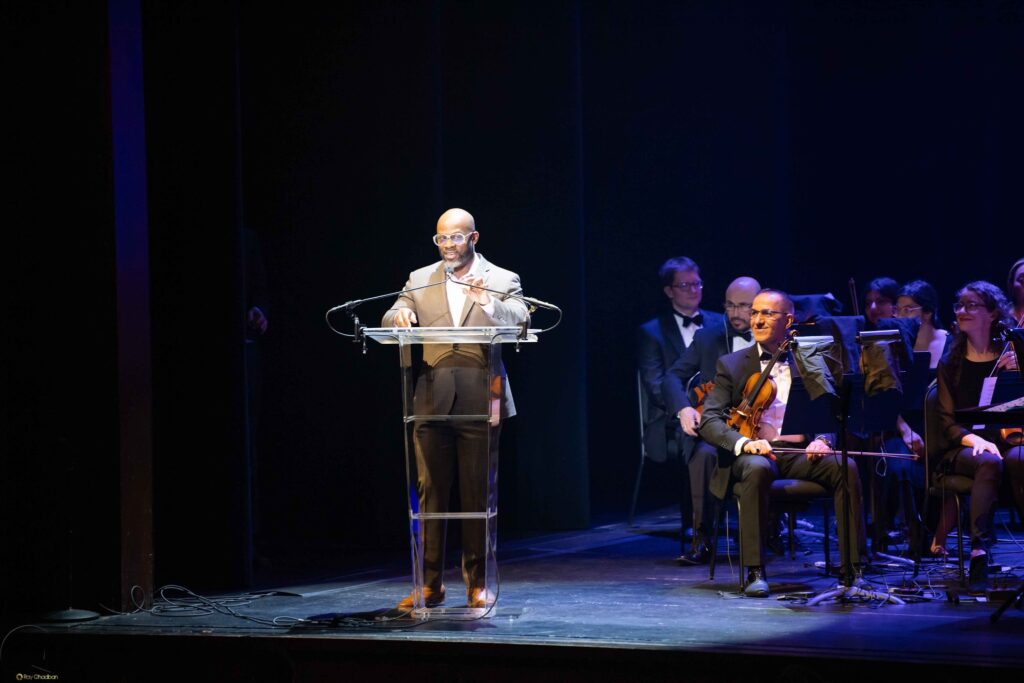
After a short introductory instrumental piece by the NAO, Michael Ibrahim shared with the audience the customs of traditional Arab orchestral performances. According to Ibrahim, “it is customary in Arab music to be participatory with the orchestra,” so it is ok to clap along and “vocalize your approval or your appreciation for the artists on stage by the following phrases,” to which the audience offered “Allah,” “Ya Ein,” and “Ya Rouhi.”
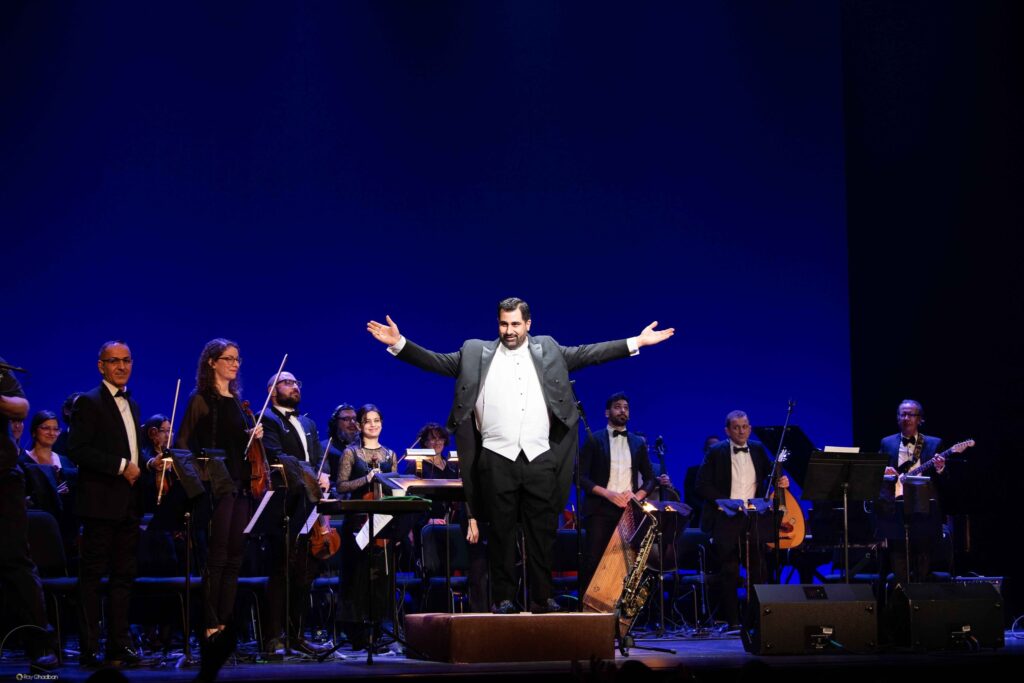
Ibrahim then welcomed Palestinian singer Nai Barghouti on stage, who began with a moving performance of “Aho Dali Sar” by Sayed Darwish. The song was written around 1919 in Egypt and detailed the struggle and suffering of the Egyptian people under British occupation, motivating them to fight back during the 1919 revolution. How fitting to begin this historic evening with an ode to um al-dunya!
Next, Lebanese singer-motrib Usama Baalbaki took the stage after a stunning violin solo by an orchestra member and performed “Shebbak Habibi” by a world-renowned singer of the same heritage, Melhem Barakat. This wonderful song was followed by Syrian singer Lubana Al-Quntar’s incredible performance of “Ya Tuyur” by her relative, Asmahan. Amid light-hearted jokes and skillful crowd work by Michael Ibrahim, Nai Barroughti retook the stage to perform “Ifrah Ya Albi” by “the Lady” of Arabic music herself, Um Kalthoum.
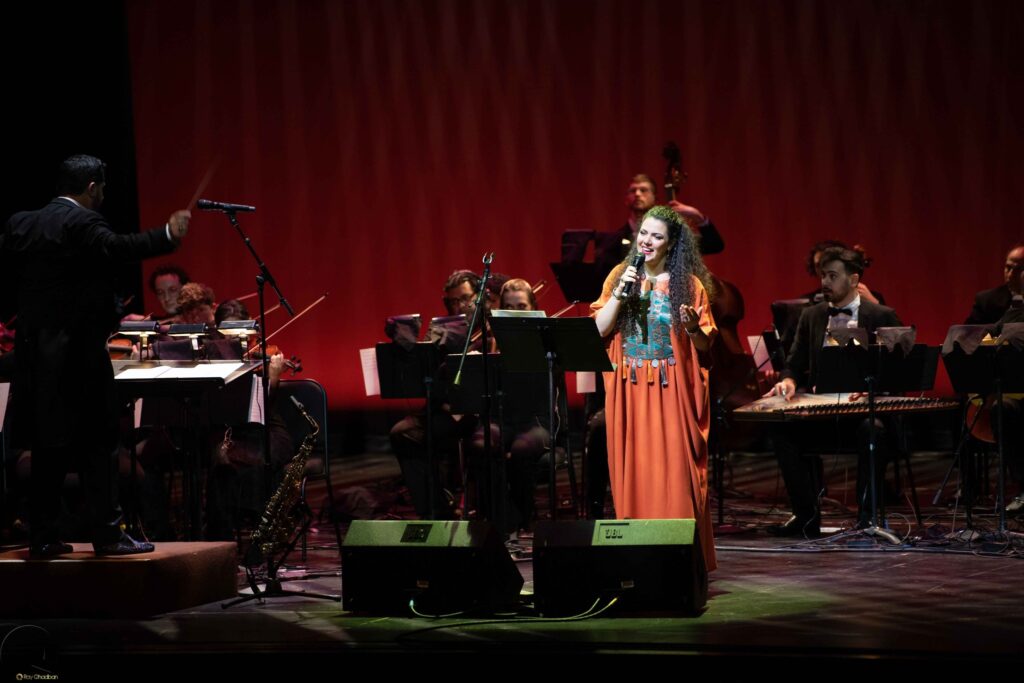
The NAO then played “Olive Harvest,” a piece from the repertoire of Simon Shahin, a Palestinian-American musician, and composer who paved the way for Arab-American musicians to share their heritage through music in the US After an incredible rendition of the song by the NAO’s musicians, Usama Baalbaki retook the stage to deliver an elegant performance of “Hebeena Hebeena” by Farid Al-Atrache. The song’s chorus caught on quickly with the audience, as they chimed in to sing it when prompted by Michael Ibrahim.
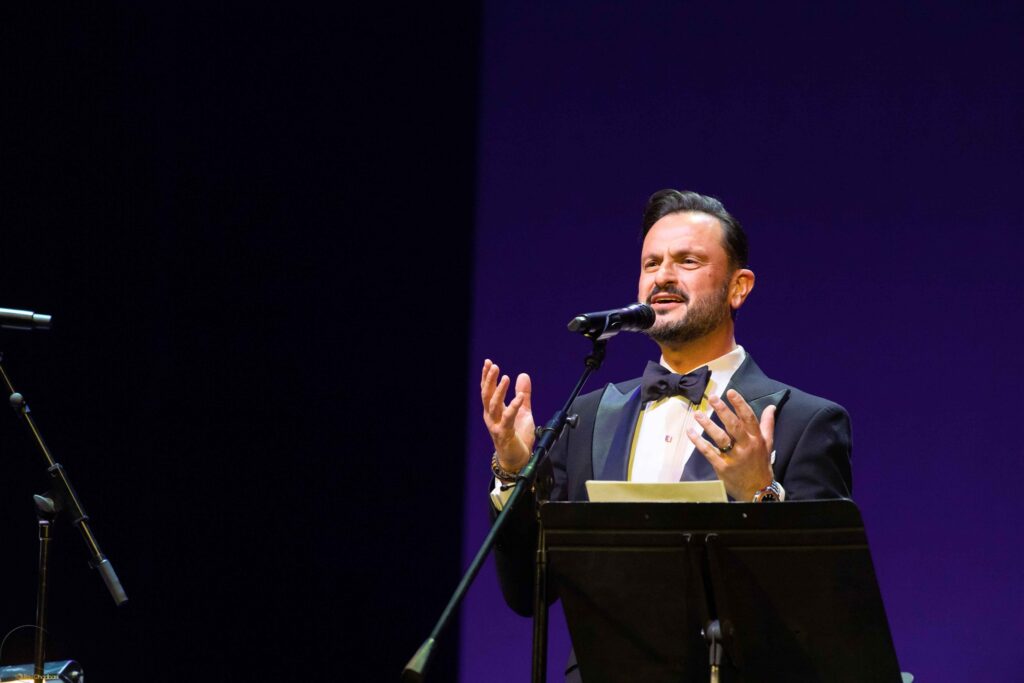
Michael Ibrahim then shared with the audience the story of Fayrouz Al-Halabiya, an Arab-Jewish singer living in Aleppo in the 1920s, who supposedly inspired the name of Fairuz, the world-renowned Lebanese singer of the same name. Lubana Al-Quntar then performed a beautiful rendition of “Hizi Mahramtik” by Fayrouz Al-Halabiya. Nai Barghouti then performed her last song of the evening, called “Haramt Aghani,” or “I Will Never Sing Again,” released in June as part of her first album. Next, Usama Baalbaki took the stage for an energetic performance of “Al Louma” by Wadi Al Safi, which prompted the audience to clap when cued by Michael Ibrahim.
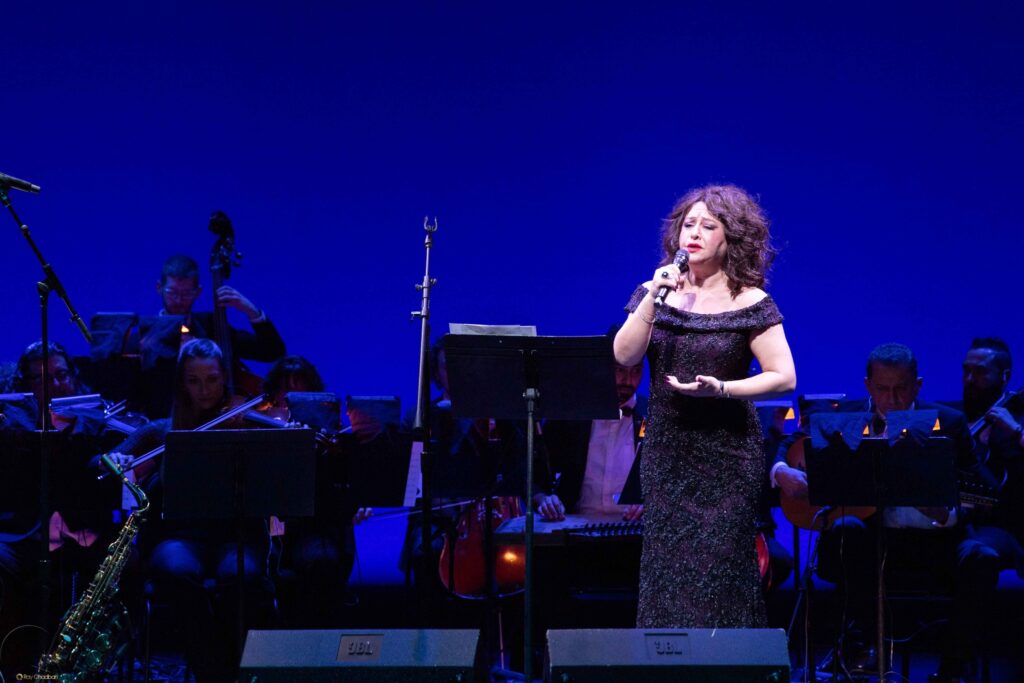
Then, Michael Ibrahim announced the final song of the evening, with protests from throughout the audience, not wanting the wonderful evening to end. Usama Baalbaki delivered an excellent closing performance of “Sawah” by the incredible Egyptian musician Abdel Halim Hafiz. The evening ended with a minutes-long standing ovation from the audience as Nai and Lubana joined Michael, Usama, and the NAO on stage, and Michael bid the audience goodnight.
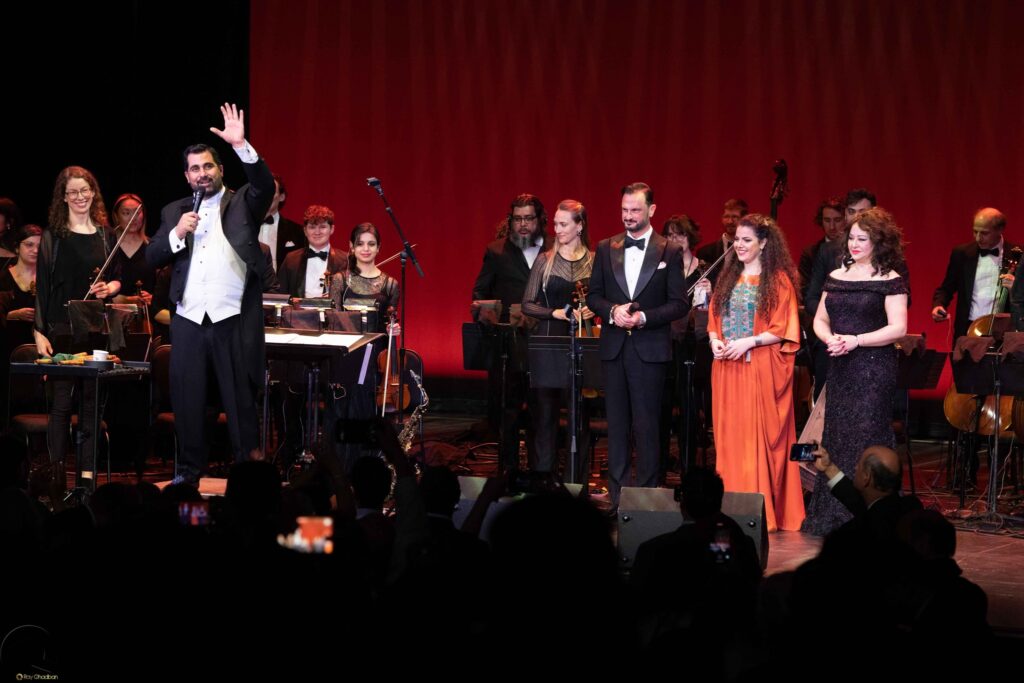
To view the entire Friday night concert, click here!
Saturday, February 18:
On Saturday, the appreciation of Arabic music continued with Emad Batayeh’s concert and hafla on the Millenium Stage and Grand Foyer. The Detroit-based Jordanian-American singer performed a medley of popular songs from throughout the Arab world, from Egypt to Iraq to Palestine and everywhere in between. The energetic performance prompted attendees onto the dance floor, Arabs and non-Arabs alike, including children, adolescents, and adults. Looking around, one could see parents and children bonding, couples enjoying their time together, and friend groups hanging out. It was indeed a beautiful time for the community, complemented by several high-energy dabka circles led by Dr. Amal and Warren David. While the concert ended after an unforgettable hour, guests were encouraged to move up to the foyer to continue the evening and network with one another.
To view the entire Saturday night performance, click here!
Sunday, February 19th, 2023:
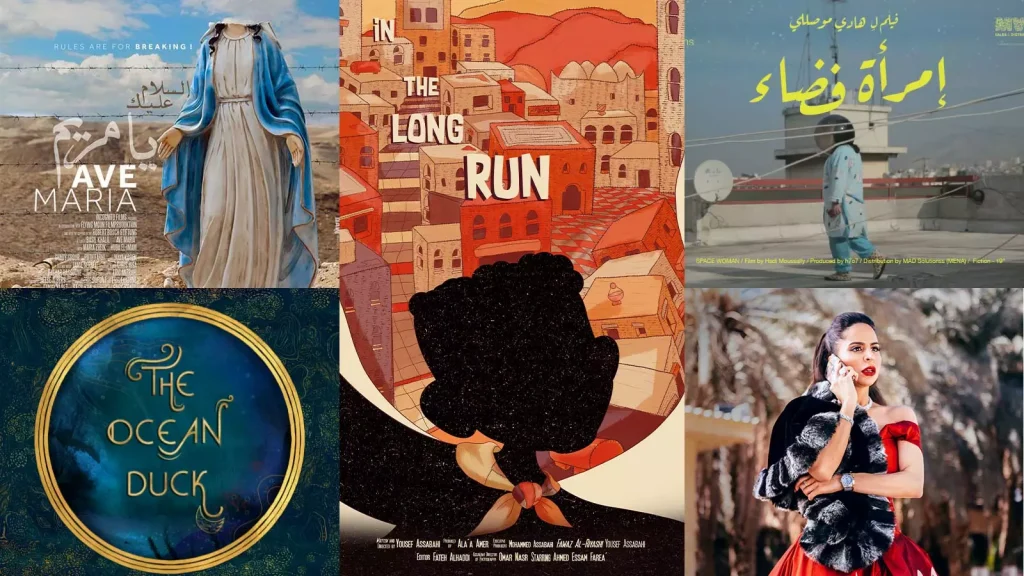
Sunday’s event showcased an assortment of short films sponsored by the Arab Film and Media Institute (AFMI). AFMI is a nonprofit organization initially founded by a team that successfully put together one of the biggest and oldest Arab Film Festivals in North America. From organizing film screenings to offering filmmaker services, AFMI devotes its support to social impact and justice by supporting Arab filmmaking talent throughout the United States. In collaboration with the Kennedy Center’s social impact program, the institute’s film screening this weekend aimed to demonstrate the pinnacle of Arab American filmmaking and all it has to offer. Serge Bakalian, the Executive Director and Founder of AFMI, opened the program by commenting on the artistic beauty and diversity of the short film collection. He was accompanied by Yasmina Tawil, Director of Film Programming at AFMI.
The films included were The Shadows of the Butterflies, Coming Home, The Ocean Duck, In the Long Run, Ave Maria, Dunya’s Day, and Space Woman.
The Shadows of the Butterflies (2022) by Sofia El Khyari is a film that encapsulates the importance of time and how we spend our lives. The film’s setting resides in a forest where a woman, surrounded by butterflies, is constantly reminded of her past. The movie symbolizes that anyone can find refuge in nostalgia and the fond memories we frequently accumulate over a lifetime.
Coming Home (2021) by Naim Naif & Margot Bowman follows a group of Palestinian-American dancers who utilize a Levantine folk dance, the Dabka, to deeply connect with their community and homeland.
The Ocean Duck (2021) by Huda Razzak tells a tale of a woman visiting her sickly grandmother when she is suddenly taken back to her past as many memories come rushing back. This film harmonizes aspects of ancient poetry with a contemporary story of a young woman and her beloved grandmother.
In the Long Run (2022) by Yousef Assabahi gives a view into the story of a child’s imagination as he adventures through the historical city of Ibb, Yemen. While following the child’s adventure through the city, the film indulges recurring themes of fate, fear, and faith.
Ave Maria (2015) by Basil Khalil depicts a story about a family of religious Israeli settlers whose car breaks down during Sabbath outside a Palestinian convent in the West Bank. While searching for help, five nuns taking part in their vow of silence offer the family a solution.
Dunya’s Day (2019) by Raed Alsemari takes us to a graduation party for a girl named Dunya. The only thing missing from this perfectly planned event is the help of her family and household. In this 9 min film, Raed Alsemari shows how Dunya’s day might be heading towards disaster.
Space Woman (2021) by Hadi Moussally is a remarkable film that takes us on a journey with a woman named Maha. At 64 and set on retirement, Maha has finally realized that her wildest dream might be in sight. She aims to make it to space and fulfill her long longstanding dream of becoming an astronaut.
Last but not least, we want to thank our sponsors for their generosity and support. Their contribution has made a tremendous impact on promoting and sustaining the Arab American heritage and identity and has helped us to continue the mission of preserving and celebrating the rich culture of Arab Americans. We thank them for their invaluable support.
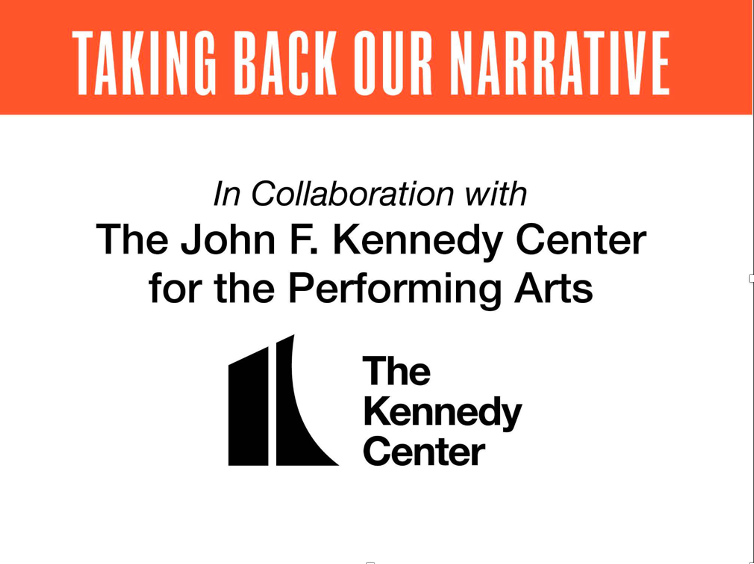
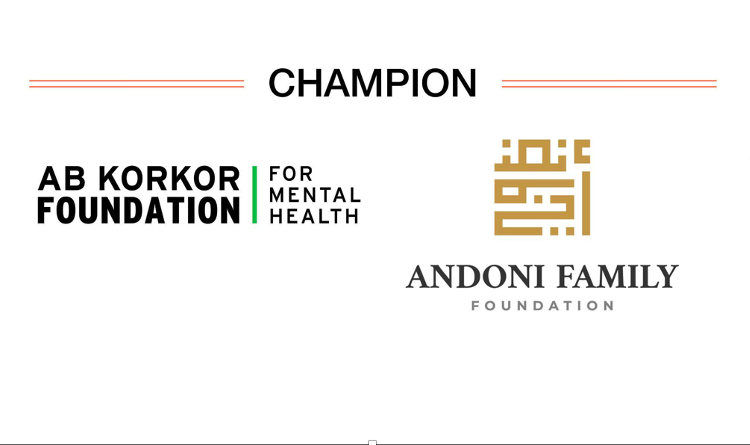
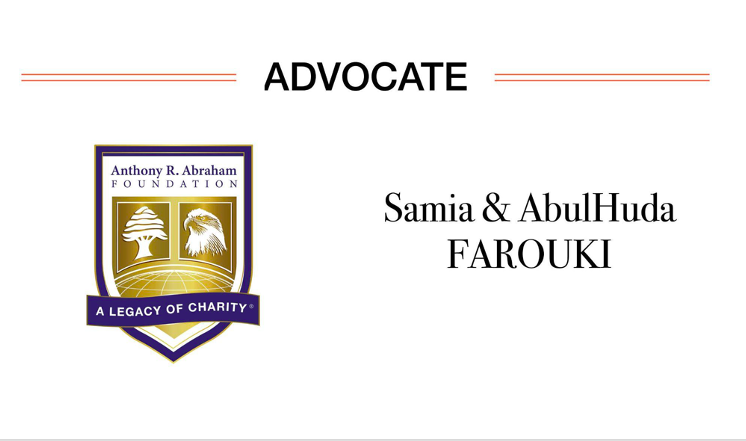
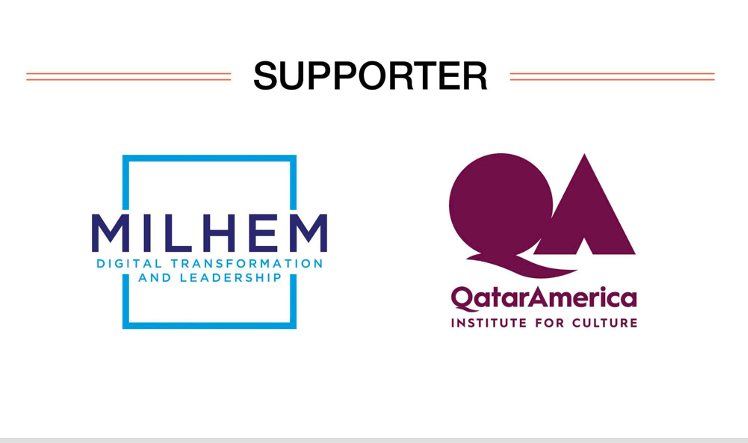
Check out Arab America’s blog here!








